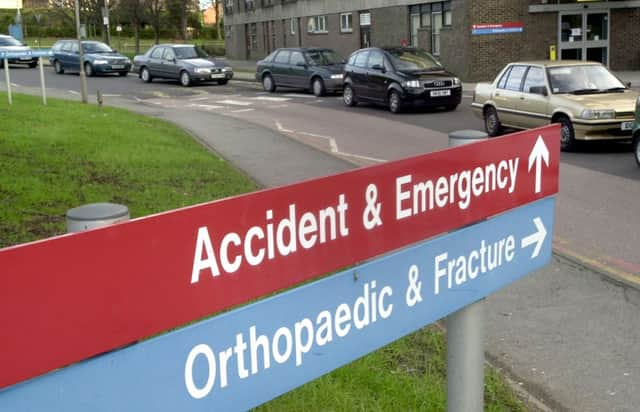Government urged to act on accidental injuries to under-5s to reduce A&E burden


The Royal Society for the Prevention of Accidents (RoSPA) and the Royal College of Emergency Medicine (RCEM) are calling for a £20million-per-year prevention programme, and will be launching a report of their research, called Action on Accidents to Relieve Pressure on A&E, to policymakers and health experts at a House of Lords reception today (Monday, November 23).
According to their research, A&E departments treat a disproportionate number of unintentional injuries within three age groups – under-5s, 15-24s and over-70s – with under-5s accounting for 7 per cent of all hospital emergency treatment. The cost of that treatment to the NHS in England in 2013/14 was £140million.
Advertisement
Hide AdAdvertisement
Hide AdWith 72 per cent of unintentional injuries to under-5s occurring in the home, RoSPA and RCEM believe injury prevention programmes targeted at this group offer the best opportunity to reduce harm, A&E attendances and hospital admissions.
A 30 per cent reduction in emergency treatment for under-5s would reduce the overall burden on A&E by 2 per cent – 165,000 attendances and 14,600 admissions – a realistic aspiration.
Injury prevention programmes such as RoSPA’s Safe At Home, which combine education for parents and professionals with safety equipment for families, have proved to be effective and inexpensive and have been shown to achieve a 29 per cent reduction in hospital admissions.
Once the problem with under-5s starts being tackled, attention can then be turned to the other groups disproportionately affected by unintentional injury.
Advertisement
Hide AdAdvertisement
Hide AdTom Mullarkey, RoSPA’s chief executive, said: “RoSPA’s experience of nearly a century of injury prevention shows that a combination of education, information and safety equipment, targeted at the most vulnerable families in areas with the highest injury rates, can produce outstanding results.
“It would cost a relatively small amount of money each year to make a huge difference, not only to the pressures on A&E and the amount of money spent, but also to the lives of those whose lives can be devastated by accidents.“Accidents don’t have to happen, and the sooner we address this pressing issue, the sooner we begin to deal with the burden on our A&E departments.”
Dr Cliff Mann, President of the Royal College of Emergency Medicine, said: “The programme we are proposing would prevent substantial numbers of accidents involving children under 5 with a consequent reduction in injuries, far too many of which cause significant harm and long term effects.
“A&E doctors, whilst determined to minimise the consequences of injury, would much rather such injuries did not occur. Many are avoidable through simple measures. The Royal College of Emergency Medicine is delighted to be able to make a positive contribution to injury prevention through our partnership with the Royal Society for the Prevention of Accidents.”
Advertisement
Hide AdAdvertisement
Hide AdRoSPA and RCEM say an ideal programme would see homes visited by RoSPA-trained safety educators, explaining individual hazards which each family faces, and arranging the fitting of safety equipment such as stairgates and fireguards where needed, while complementing the work already carried out by health visitors.
The proposals will be delivered to the reception at the House of Lords, which will also see speakers including RoSPA President Lord McKenzie of Luton, Tom Mullarkey, RCEM President Clifford Mann, and Judith Ellis, chief executive at the Royal College of Paediatrics and Child Health, which has also voiced its support for the programme.